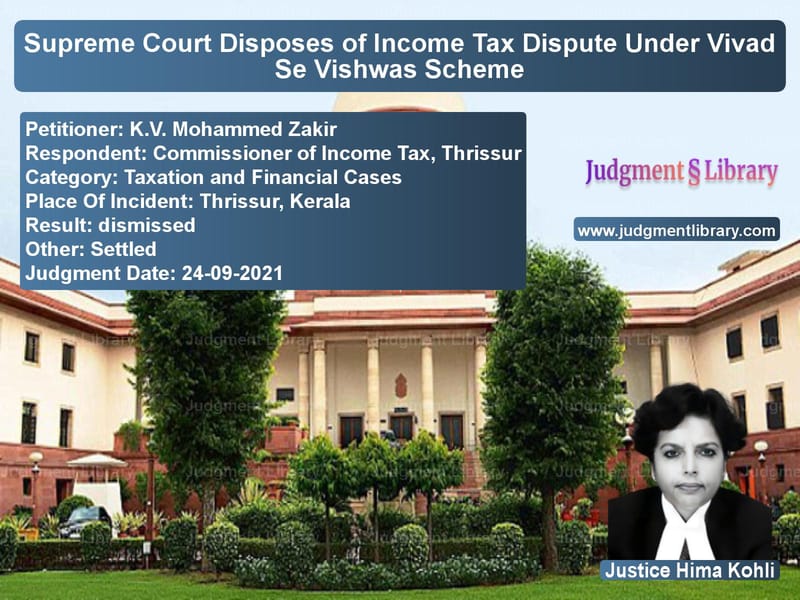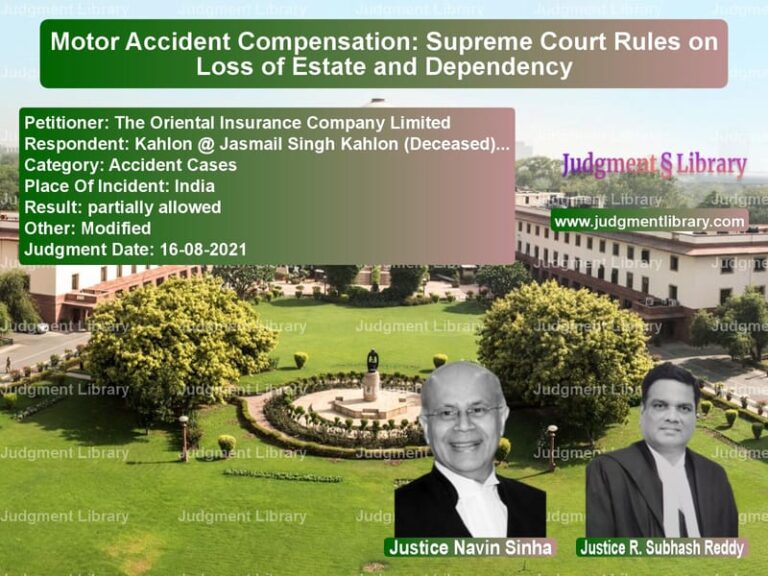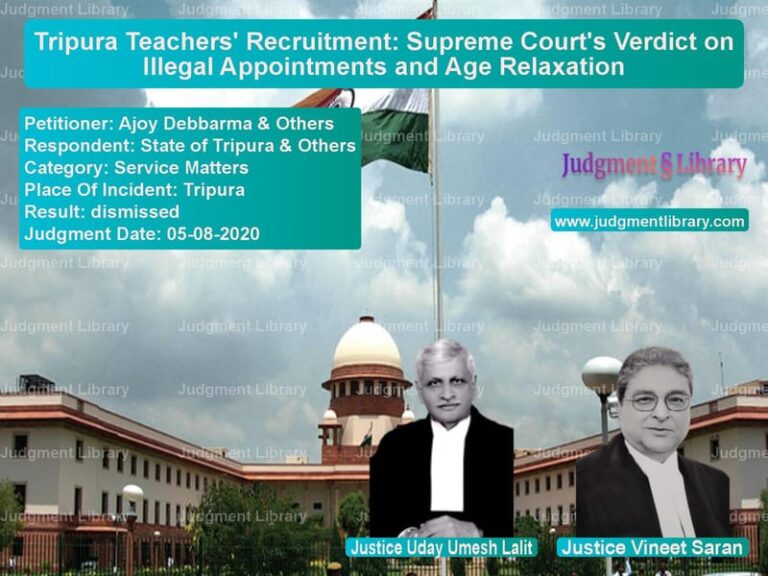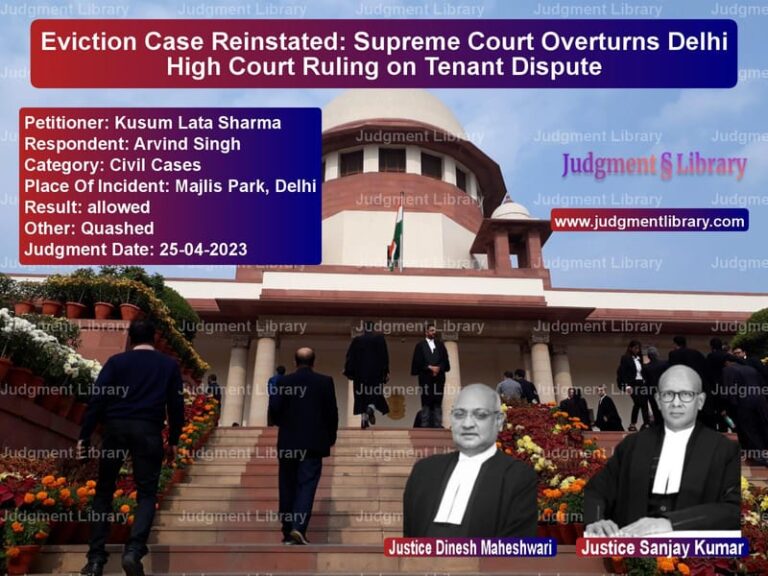Supreme Court Disposes of Income Tax Dispute Under Vivad Se Vishwas Scheme
The Supreme Court of India recently concluded a long-standing tax dispute in the case of K.V. Mohammed Zakir vs. Commissioner of Income Tax, Thrissur. The case, which involved contested tax demands, was withdrawn after the appellant chose to avail the benefits of the Direct Tax Vivad Se Vishwas Act, 2020. This Act, introduced by the Indian government, provides taxpayers with a structured settlement mechanism to resolve pending tax disputes by making specified payments, thus avoiding prolonged litigation.
Background of the Case
K.V. Mohammed Zakir, the appellant, had been engaged in a legal battle with the Commissioner of Income Tax, Thrissur over tax liabilities assessed by the Income Tax Department. The dispute arose due to differences in tax assessments, where the appellant contested the tax demand imposed by the authorities.
With several years of litigation behind the case, the introduction of the Direct Tax Vivad Se Vishwas Act, 2020, presented an alternative dispute resolution option. The scheme was launched to reduce the backlog of tax litigation in India, allowing taxpayers to resolve disputes by paying a determined amount without any further penalties or interest.
Read also: https://judgmentlibrary.com/supreme-court-orders-fresh-tribunal-review-in-anti-dumping-duty-case/
Application for Withdrawal
During the proceedings before the Supreme Court, the appellant moved IA No. 111364/2021, seeking permission to withdraw the appeal. The request was made on the basis that the appellant intended to resolve the dispute under the Vivad Se Vishwas scheme.
The counsel representing the Income Tax Department had no objections to the appellant’s withdrawal request, indicating that the department supported the use of the government-backed settlement scheme.
Supreme Court’s Observations and Order
- The Supreme Court acknowledged that the Direct Tax Vivad Se Vishwas Act, 2020, had been implemented specifically to reduce tax disputes.
- The Court recognized the appellant’s intention to settle the dispute outside of prolonged litigation.
- The appeal was officially allowed to be withdrawn, and the case was disposed of accordingly.
Legal Provisions Considered
The Supreme Court’s ruling is significant in the context of taxation laws in India. The following provisions were considered in the decision:
- Direct Tax Vivad Se Vishwas Act, 2020: This scheme was introduced to offer taxpayers a one-time opportunity to resolve pending disputes by making specific payments without the burden of additional penalties.
- Income Tax Act, 1961: The case involved disputed assessments under the Income Tax Act, which provides guidelines for tax collection, assessment, and appeal procedures.
- Code of Civil Procedure, 1908: The Court followed standard procedural law regarding withdrawal of cases when both parties mutually agreed to settle.
Arguments by the Petitioner (K.V. Mohammed Zakir)
- The petitioner sought to withdraw the appeal to avail the benefits of the Vivad Se Vishwas scheme.
- He argued that the scheme provided a fair resolution mechanism to settle tax disputes efficiently.
- He contended that withdrawing from prolonged litigation was in the best interest of both parties.
Arguments by the Respondent (Commissioner of Income Tax, Thrissur)
- The respondent had no objections to the withdrawal application.
- The respondent noted that the government had introduced the scheme to promote speedy resolution of tax disputes.
- The respondent emphasized that the case should be disposed of in accordance with the taxpayer’s intent to settle.
Implications of the Judgment
The Supreme Court’s decision to dispose of the case under the Vivad Se Vishwas scheme has broader implications for tax litigation in India. The ruling highlights key aspects of tax dispute resolution:
- Encouraging Alternative Dispute Resolution: The judgment reinforces the government’s initiative to reduce pending tax disputes and encourage voluntary settlement.
- Judicial Endorsement of Taxpayer-Friendly Schemes: The Court’s recognition of the Vivad Se Vishwas Act signals judicial support for tax resolution policies that ease litigation burdens.
- Impact on Future Tax Cases: The case sets a precedent for taxpayers to consider government-backed resolution schemes instead of pursuing prolonged legal battles.
Conclusion
The Supreme Court’s ruling in K.V. Mohammed Zakir vs. Commissioner of Income Tax, Thrissur underscores the importance of structured tax dispute resolution mechanisms in India. By allowing the appellant to withdraw the case in favor of settling through the Vivad Se Vishwas scheme, the Court has reinforced the effectiveness of the government’s initiative to reduce tax litigation. The decision serves as a valuable precedent for taxpayers considering alternative dispute resolution options to settle their tax liabilities efficiently.
Petitioner Name: K.V. Mohammed Zakir.Respondent Name: Commissioner of Income Tax, Thrissur.Judgment By: Justice Hima Kohli.Place Of Incident: Thrissur, Kerala.Judgment Date: 24-09-2021.
Don’t miss out on the full details! Download the complete judgment in PDF format below and gain valuable insights instantly!
Download Judgment: k.v.-mohammed-zakir-vs-commissioner-of-inco-supreme-court-of-india-judgment-dated-24-09-2021.pdf
Directly Download Judgment: Directly download this Judgment
See all petitions in Income Tax Disputes
See all petitions in Tax Refund Disputes
See all petitions in Judgment by Hima Kohli
See all petitions in dismissed
See all petitions in settled
See all petitions in supreme court of India judgments September 2021
See all petitions in 2021 judgments
See all posts in Taxation and Financial Cases Category
See all allowed petitions in Taxation and Financial Cases Category
See all Dismissed petitions in Taxation and Financial Cases Category
See all partially allowed petitions in Taxation and Financial Cases Category







